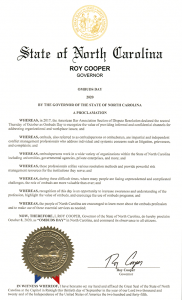
What is Ombuds Day?
In 2018, the American Bar Association Section of Dispute Resolution declared the second Thursday of October as Ombuds Day. October 8, 2020 is Ombuds Day, a recognition of a profession that has existed for centuries yet remains relatively unknown and underutilized: the ombuds. This year’s theme is “Ombuds: Unusual name. Important service.”
The primary goal of Ombuds Day is to improve public awareness of ombuds.
Our actions are intended to:
- educate the public about the role of ombuds,
- explain the wide variety of services that ombuds provide,
- encourage greater use of ombuds programs and services, and
- highlight the value ombuds bring to the institutions and constituents they serve.
The secondary goals of Ombuds Day are to connect ombuds in their respective communities and to recognize their important work.
What is an Ombuds?
Ombuds, also known as ombudspersons, ombudsman, ombudsmen, are confidential, impartial, and independent conflict management professionals in universities; federal, state, and local governments; healthcare facilities; and a variety of other organizations. However, their roles and services are relatively unknown compared to other methods of resolving conflicts such as mediation, arbitration, and litigation.
Ombuds are uniquely qualified to resolve conflicts and to serve as a conduit for change through their ability to bring significant and/or repetitive issues to management’s attention in a safe and confidential way, particularly with sensitive or controversial issues. They may raise issues to leadership that others cannot or will not discuss. This includes identifying unintended consequences of programs and policies that negatively affect constituents. Given the profession’s versatile nature, many variations or types of ombuds practices have emerged. Some work with constituents who are external to their organization, while others work with internal constituents such as employees or students. Some investigate complaints, while others serve as advocates. While this versatility is beneficial, it can also create misunderstandings about the profession.